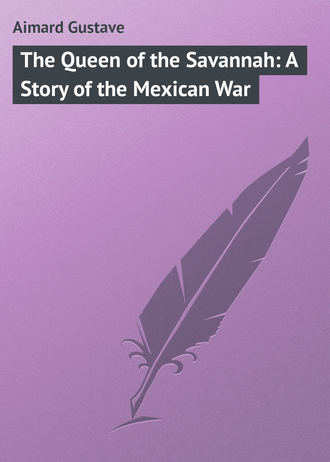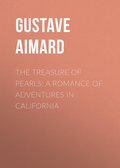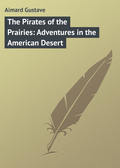
Gustave Aimard
The Queen of the Savannah: A Story of the Mexican War
This deposition produced a marked effect on the members of the council. Each was of opinion that they must at once start in pursuit of the fugitives, in order not to allow them time to recover from their terror and reassemble. This was the general's opinion too; still, under circumstances of such gravity, he had desired to avoid responsibility, and appear constrained to yield to the wishes of his officers. As generally happens in such cases, the Spaniards passed from a state of the utmost dejection to the greatest braggadocio. The Mexicans, who had so long caused them to tremble, were only scoundrels, unworthy to contend with brave men, and they could be brought to order with the flat of the sabre.
The general, considering it useless to leave a strong garrison in the town, as the enemy had retired, and not wishing, in the case of the Mexicans making a stand, to advance without an imposing force, ordered two regiments of cavalry to mount, each trooper having an infantry man on his crupper, and took two field guns with him. This small army amounted to about five thousand men, more than sufficient to pursue and destroy demoralized bands, who would probably attempt no defence and be easily cut up. When all was ready for the start, General Cárdenas gave orders to bring up the Canadian, who had first brought him the happy news of the enemy's flight. The latter arrived, accompanied by the officer to whom he had been given in charge. The general smiled on the hunter.
"Listen to me," he said to him, "you appear a man of sense. You will come with us."
"What to do, General?" the hunter answered coldly; "I suppose you do not want me anymore?"
"I should like to have you near me."
"In order to blow out my brains, if you think proper to do so, eh?"
"That is possible; but come, notwithstanding."
"That would not be fair, General; I have honestly kept to my bargain. It is not my fault if, instead of quietly remaining here, you think proper to roam about the country at the risk of something happening."
"Then your advice would be that I should remain here?" the general said to him, with a searching glance.
"I have no advice to give you, General; I am neither a soldier nor an officer, and your affairs do not concern me. I tell you my opinion, that is all."
"But you are a wood ranger?" he continued, after a moment's reflection.
"Yes, General, and nothing else."
"In that case, you will make a famous scout."
"You want to make a second bargain with me, I think."
"Perhaps so. Do you refuse?"
"I am not at liberty either to accept or decline. You have the power on your side, and I am forced to obey."
"I like to hear you talk in that way. Perhaps you can find the enemy for me?"
The hunter detected the snare.
"Hang it!" he said simply, "As a wood ranger I can easily follow a trail. Put me on the traces of the Mexicans, and if they have not run to earth like prairie dogs, or flown away like eagles, there are heavy odds in favour of my bringing you up with them."
The general reflected.
"Listen to me," he said directly after, "I trust to you. If you serve me faithfully, you shall be nobly rewarded; if you deceive me, you will die."
"I do not understand you; I will try to bring you up with the people you are looking for; but I cannot pledge myself to more, as the rest concerns you."
"That is all I ask."
"On those conditions I am your man."
"Come along, then," the general continued; "but," he added, looking fixedly at him, "remember that you risk your head; at the slightest suspicion I will have you strung up without the least hesitation."
The Canadian merely shrugged his shoulders in answer to this threat, smiled craftily, mounted a horse that was brought him, coolly placed himself on the general's right hand, and at the word of command the small corps left the town in good order. So soon as it reached the plain, it proceeded towards the Mexican camp, curiously watched by all the inhabitants of Coahuila, who had flocked to the ramparts to witness the departure of the Spaniards, and who, in all probability, formed internal vows never to see them again.
CHAPTER XXXIV.
THE TEOCALI
Sotavento was completely exhausted by the efforts he had been compelled to make in reaching the islet on which he had so luckily found a refuge. For nearly an hour he lay with his eyes closed and in a half fainting state. When his strength had gradually returned, when his blood began to circulate more freely and his ideas regained their equilibrium, he thought of the horse, which, in his present situation, became the more precious to him, as the animal alone could save him.
The poor brute had halted a few paces from its master with hanging head and piteous look. The Indian rose, picked up a pebble, went to the horse coaxingly, and began vigorously rubbing all parts of its body, after which operation he dried it with a wisp of grass. The horse perceiving the comfort this produced, whinnied with pleasure as it rubbed its intelligent head against the Indian's shoulder, and then began eagerly browsing the grass which grew profusely in this sequestered spot.
"Come," Sotavento muttered with visible satisfaction, "this poor brute has had a luckier escape than I expected; it has bottom, and will be all right after a few hours' rest."
Certain of finding his steed again when he wanted it, he let it browse in peace, and went off to examine the islet and find out the exact nature of his position, whether good or bad. He could not think of eating, for he was utterly without provisions, but that troubled him very slightly. The Indians, like all nomadic races, are accustomed to endure without complaint, and almost without noticing them, privations which would render a European desperate and incapable of getting out of the scrape. The only weapon the Stag possessed was the knife he took from the soldier whom he had scalped; and hence he must display the greatest prudence, and carefully avoid a meeting with either men or wild beasts.
The islet on which he found himself was rather large and completely covered with wood. The Indian walked its entire length; but on reaching the end he uttered a cry of disappointment, for he noticed a portage, that is to say, a line of rocks crossed the whole width of the river, and formed an impassable crest of breakers; hence he could not dream of gaining the mainland on that side. Had he been alone he would have probably tried, and by his skill and strength have succeeded in reaching land by leaping from one rock to another; but he would not abandon his horse.
On the American savannahs a man unarmed and without a horse is hopelessly lost. Sotavento was aware of this, hence the thought did not occur to him of going away alone. He had crossed the whole length of the isle, and now resolved to go round it. It was a rough job to be undertaken by a man who had not taken any food for twenty-four hours, and whose strength was exhausted by long moral and physical fatigue; still his salvation depended on his resolution, and he did not hesitate. His search was protracted, and for a lengthy period sterile; he walked slowly along the sand with his eyes fixed on the opposite bank, seeking, without desponding, a spot where his horse could stand and climb the scarp with no excessive difficulty. At last he noticed at about the centre of the isle a place where the water was much clearer than elsewhere; it was a shallow ford, for the sand forming the riverbed was visible. He boldly entered the water and walked forward; he was not mistaken; he had really found a wide ford whose depth did not exceed two feet.
This discovery was most lucky; but this was not enough; he must assure himself whether the slope of the opposite bank was not too steep for his horse's hoofs. The Indian continued his march and crossed the river. Then he saw what he had been unable to discover from the isle – a mass of rock projected some distance into the stream and formed an elbow, behind which opened a species of haven, ascending to the top of the cliff by an almost insensible incline. The deeply formed marks in the sand indicated that this was a watering place to which wild beasts proceeded to drink at night. People say that a slice of luck never comes alone; Sotavento had a proof of this on the present occasion, for the ford and road were on the side of the stream to which he would have to cross in order to join his tribe. Henceforth at his ease, and certain of rejoining his friends, the Stag returned to the isle.
The sun had risen a long time, and the heat was beginning to grow intolerable. The Indian, who was in no hurry, resolved to let the great heat pass and not start till toward evening; moreover, the violent exercise he had taken in seeking a passage had greatly fatigued him, and he needed rest. When he rubbed down his horse, he had unbuckled the girths and removed the saddle, which he threw on the grass without looking at it. On his return, at the moment when he sought a convenient spot for sleeping, his eyes fell accidentally on this saddle, and he noticed an alforja, or a species of double canvas pocket, which every Mexican carries with him when travelling, which he had not observed, for the simple reason that these bags, fastened behind the saddle, were concealed by a blanket and sheepskin, which almost entirely covered them.
The poor soldier whom the Indian had killed carried in these alforjas all his wretched property, flint and steel, and tobacco, precious things for the fugitive; but what caused him greater pleasure still, there was nearly a yard of tasajo, meat dried in the sun, as well as a dozen biscuits, and a large lump of goat's cheese. All this was wet though, it is true; but what did the Indian care for this, when he was half dead of hunger.
Instead of sleeping, as he had originally intended, Sotavento spread out all the provisions on the ground to let them dry in the sun, which was effected in less than ten minutes, collected dry leaves, lit a fire, roasted his tasajo, and began eating as Indians eat when they have long gone without food, that is to say, with no thought of the morrow. He devoured all his provisions at one meal; then, his hunger appeased, he filled his pipe, and began smoking with the beatitude and satisfaction of a man whose life has hung by a thread, and who has only been saved by a miracle.
Sotavento thus spent the greater part of the day in a gentle far niente, smoking, sleeping, and ruminating plans of vengeance, for he constantly thought of the two hapless prisoners he had left at the teocali, whom he was most anxious to rejoin now that he had escaped such imminent danger. When the sun began to elongate enormously the shadows of the trees, and its oblique beams had lost nearly all their heat, the Indian considered it time to start; horse and rider, well fed and rested, were in a condition to ride a long distance. Sotavento got up, saddled his horse, and leading it by the bridle to save it unnecessary fatigue, waded through the ford; when he reached the other bank, he took a parting glance of gratitude at this isle, which had offered him such pleasant shelter. Then he mounted, and whispering to his horse the word "Santiago," he set out, as if borne on the wings of the wind, in the direction of the desert.
It was not till nine o'clock of the next evening that he reached the ford of the Río del Norte. He crossed, let his horse breathe for a while, and henceforth certain that the enemy could not catch him up, he continued his desperate ride across the savannah. Still, in spite of his diligence, the Indian did not reach the teocali until the third evening after his flight. During his absence the number of his comrades had greatly increased. The messenger he had sent to the village after the capture of Doña Emilia had returned, bringing with him all the male and female members of the tribe whom pressing business did not detain at the atepetl. The Indians were curious to witness the punishment of the prisoners. With them it was an act of justice they were about to perform, for the vengeance they had pursued for so many years was on the point of being consummated.
Sotavento's first care, on reaching the teocali, was to inquire after his prisoners; they were still calm and resigned. The chief, in his heart, was vexed at seeing so many warriors assembled; he, however, concealed his dissatisfaction, and, on the contrary, feigned great joy, intending, if circumstances demanded it, to act vigorously; but wishing temporarily to remain neutral, lest he should arouse the suspicious susceptibility of his comrades, and make them distrustful about the plans he was meditating. The Stag knew that, in case of necessity, he could claim the support and assistance of the young warriors of the tribe, and that he would only have to contend with the old sachems, in whose hearts no feeling but that of revenge any longer existed.
The council of the chiefs was assembled at the moment when he arrived, and he at once proceeded to it. The sachems received him with great marks of distinction, and congratulated him on the fortunate result of his expedition; then they informed him of the measures decided on with respect to the prisoners. These were simple and terrible; the two ladies would be fastened to the stake on the next day, tortured for four hours, and then flayed alive and burnt. The Stag did not wince, he listened to these fearful details without manifesting the slightest emotion; but when the president of the council, who was no other than his father, had imparted to him these resolutions, he asked leave to speak, which was granted him. Then, in an artful harangue, perfectly suited to the intellect of the men who surrounded him, the chief adroitly went over, all the services he had rendered the tribe; the long exile to which he had been condemned in order to insure the success of his plans; the countless difficulties he had had to overcome not to arouse the suspicion of those whom he was betraying; what trouble and care he had been obliged to take in at length securing the captives. He insinuated that no reward had been offered him, although he had a right to claim one; that, according to the Indian fashion, women become the property of those who carry them off; that, consequently, the prisoners belonged to him, and that he alone had the right to decide their fate; but that, if he claimed this right at the moment, it was not for the sake of thwarting the decision of the council, but, on the contrary, to ensure the general vengeance, and render it more exemplary.
The chiefs, who at first listened to this address with marked dissatisfaction, applauded the unexpected finale, and urged the Stag to explain himself. The latter, inwardly satisfied with the effect his remarks produced, only allowed himself to be pressed just long enough to excite the general curiosity more.
"What good is it torturing these two squaws in such a way? Is that the manner in which you would take your revenge? It would be ridiculous, and last but a few hours; and I propose something better. These women are white, rich, and accustomed to all the refinements of luxury which civilization procures; deprive them of all this, not by killing them, but by letting them live in a condition a thousandfold worse than death. However cruel the palefaces may be, they love their children as we love ours. This woman, whom the people of her own colour call Doña Emilia, whom we call the Queen of the Savannah, on account of all the wrongs she has dealt to us, adores her daughter. Order this girl to marry a chief of the tribe, and force her mother to consent to this union. Once the wife of a chief, this haughty Spaniard will suffer tortures a hundred times more terrible than those she would endure if fastened to the stake. The mother, witness of her daughter's suffering and unable to calm or mitigate it, will suffer unusual and incessant grief, which will be the more cruel as she can have no hope. Do you not think that such vengeance is preferable to what you proposed?"
The chiefs applauded enthusiastically; Running Water alone shook his head dubiously.
"That race is intractable," he said, "and nothing can tame it; these women will not consent, they will not accept a proposition which must appear to them dishonouring; they will prefer death."
"In that case they shall die!" the Stag shouted, with a ferocious accent.
Running Water rose.
"Yes," he said, "my son the Stag has spoken well; these palefaces, these Spaniards, whom the genius of evil sent in his wrath upon our land, hunt us like wild beasts; I myself, a few days ago, only escaped from their clutches through the protection of the Wacondah! Let the mother die, while the daughter becomes the squaw of the man who captured her; in that way our vengeance will be complete."
"Let it be so," White Crow remarked. "The Stag will communicate to the prisoners the decision of the council."
"I will do so," the chief said. "Give orders to prepare everything for the torture, for, I repeat, they shall die tomorrow if they meet me with a refusal."
The council broke up; the chiefs retired to the tents erected for them by their squaws, and soon fell asleep. The majordomo alone did not think of rest; he proceeded at a rapid pace to the spot where the prisoners were. On reaching the wickerwork which formed the door, the Indian hesitated for a moment, but, surmounting the emotion which contracted his brow, he violently opened the door, and walked in. The two ladies were sadly seated by a smouldering fire, with their heads bowed on their chests; at the noise produced by the chief's entrance, they quickly raised their heads, stifling a cry of surprise and terror. The Indian looked at them for a moment with an undefinable expression.
"I frighten you," he said, in a low guttural voice, as he smiled.
"No," Doña Emilia answered, "your presence does not terrify us, it merely excites disgust."
The chief frowned angrily, but checked himself.
"It is dangerous," he said, "to rouse the lion when you are in his power."
"The lion?" she continued, disdainfully; "You mean the coyote. The lion is brave, his character is noble, and he only attacks enemies worthy of his fury."
"Very good, I am a coyote," he continued with perfect calmness, "insult is permissible to persons who are about to die."
"Die?" Doña Diana exclaimed, with an outburst of joy that confounded the Indian. "Oh, thanks, señor; this is the first time you have brought me good news. When are we to die?"
"Tomorrow," he replied, in a hollow voice. There was a mournful silence, and then the majordomo continued —
"You seem very weary of life?"
"Yes, of such a life as you have made it; I prefer death to remaining longer exposed to the sufferings of every description to which I have been subjected during my captivity."
"You can both live if you like," he said significantly. They shook their heads in denial, but said nothing.
"At liberty," he continued.
"At liberty?" the young lady repeated, her eyes suddenly lighting up with a flash of hope.
Doña Emilia gently laid her hand on her shoulder, and addressed the chief —
"Come," she said, "explain yourself frankly; your words must conceal some terrible trap; on what condition are we to live and be free? We must be told these conditions in order to know whether we are able to accept them."
"Can life be bargained for in this way?"
"Yes, where life is to be purchased with dishonour."
"Tomorrow you will be fastened to the stake, and tortured for four hours without respite or mercy."
"What next?" Doña Emilia asked haughtily.
"After that," he continued with an ill-omened smile, "you will be flayed alive, and burnt while still quivering."
While uttering these cruel words, the chief fixed a viper glance on his captives. Doña Emilia shrugged her shoulders contemptuously.
"I am waiting for you to tell us the conditions on which you will allow us to live," she went on with a bitter smile. "They must be very horrible, since you, whom nothing checks, hesitate in revealing them to us."
"You know the condition already," he said slowly.
"Repeat it, I have forgotten it," Doña Emilia remarked.
The chief made an effort over himself, and said in a choking voice —
"That your daughter consents to become my wife."
Doña Emilia broke into a loud harsh laugh, and looked at her daughter. The latter drew herself up proudly, walked toward the chief, who was apparently calm, although a terrible tempest raged in his breast and fixed on him a glance of sovereign contempt.
"Invent the most atrocious tortures," she said to him, "I prefer death to such fearful degradation."
"Well said, my child!" Doña Emilia exclaimed, as she passionately pressed her to her heart.
The chief stamped his foot passionately; he gave the two ladies a glance of implacable hatred and went away, after saying one word of frightful meaning, "Tomorrow." So soon as the ladies were alone, they joined hands, knelt and prayed fervently to Him who alone had the power to save them.







